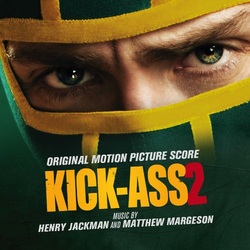
Returning from the first film is Henry Jackman’s slight but surprisingly memorable identity for the series, an optimistic bit of brassy heroism that really adds to the film’s youthful, energetic vibe. From a horn solo that seamlessly morphs into retro videogame-like electronics in "Main Titles" to its stirringly noble presence in "First Mission" and "Shark Bait/Rooftop" to its spirited full treatment in "Hit-Girl’s Farewell", the identity litters the score. It even appears in a mournful rendition in "Remembering Colonel Stars and Stripes" and in a beautifully muted variation in "Fatherly Sacrifice". While these slower cues betray the underlying chord progressions’ similarity to something that Brian Tyler might have concocted for the concept (see Eagle Eye’s "Loss of a Twin" or Bubba Ho-Tep’s "All Is Well"), they do signify the adaptability of the theme. Undeniably the most satisfying rendition of the Kick-Ass theme is the aforementioned treatment in "Hit-Girl’s Farewell", the film’s answer to Marius Vrie’s outstanding and exhilarating "Flying Home" from the first Kick-Ass film. Aside from a heavier emphasis on electric guitar and a lighter emphasis on the string motif at 1:42, "Hit-Girl’s Farewell" is pretty similar to "Flying Home" (albeit shorter) so it should please fans of the original.
While Jackman’s theme returns like a familiar face, the sequel’s wealth of new characters also call for their own identities and ensure that Kick-Ass 2 never feels like a retread. Colonel Stars and Stripes’ group of vigilante do-gooders, Justice Forever, receives treatment in "Justice Forever", a suitably rousing cue featuring some of the heavier rock elements of the score. The fast-paced, higher-pitched ostinatos that Jackman’s so fond of drive the cue, making it seem like something that would be right at home in X-Men: First Class. The electric guitar also has a constant presence at the suggestion of Matthew Margeson (something true for the score as a whole), adding to the modern rock vibe and culminating in the cue’s highlight at 1:05.
Another new addition is an infectious, almost nostalgic rock/synth theme heard in "Senior Year". It basically covers the same ground that The Prodigy’s cue "Stand Up" did in the first film, serving as the score’s buoyant and hip identity for high school, but you’ll also catch a snippet of Hit-Girl’s new theme at 0:39. Also featured in "Mindy’s First Date" and "Mindy & Dave", the identity is very loosely based on Big Daddy’s theme heard in "Honor to Serve Him" (featuring the first two notes re-harmonized). It really is a misnomer, though, to call this "Hit-Girl’s theme": the light piano motif is more heavily attributed to Mindy’s character, its relationship to Big-Daddy’s theme showing that she is still in her young age an extension of her father. Only a few times in the score is the theme applied to her superhero alias Hit-Girl, as in at the close of "Dave’s Field Test" and in "To Be a Real Superhero". More often, she shares Kick-Ass’s theme when… well, kicking ass.
The last notable addition to Kick-Ass 2’s repertoire of new themes is a rather big one and its entirely Margeson’s creation. Clothed in some bizarre S&M gear, Chris D’Amico attempts to publicize his transformation into criminal mastermind The Motherf*cker by shooting up a convenience store. Fortunately for all those involved, he’s hardly a mastermind and the plan goes afoul in comical fashion. He’s geeky and quite pathetic but D’Amico thinks that he can play ball up there alongside The Joker and Darth Vader. His theme, an overblown, ballsy bit of hard rock over chugging strings, sufficiently portrays how D’Amico thinks of himself. It receives fullest attention in "Convenience Store", but it crops up wherever The Motherf*cker exacts his burning revenge, thus dominating the villainous material on album. Unfortunately, it doesn’t do enough to make "Toxic Mega-C*nts", the material for D’Amico’s antithesis to the do-gooder group Justice Forever, that interesting. The lack of as solid an identity for the Toxic Mega-C*nts as that of Justice Forever is the score’s real weak link, but their material inhabits the same hard rock sonic realm as the Motherf*cker’s and his theme dominates their scenes enough so that you won’t really notice the omission until you peruse the album release.
In addition to these themes, the score features an action finale cue in "Warehouse Showdown" that can best be described as "in-your-face". There’s plenty of high chopping strings and repeating notes slamming away at you, but it’s pretty well structured and mostly revolves around a few satisfying interactions between The Motherf*cker and Kick-Ass’s themes. Fitting for their finale duel to the death.
Overall, Kick-Ass 2 represents a more focused, compact, and cohesive extension of the ideas heard in the first film’s score. This distinctive identity is most clearly attributable to the reduction in composers from the original Kick-Ass score, but that reduction also means that Kick-Ass 2 doesn’t get the chance to benefit from the individual strengths that Vries, Eshkeri, Murphy, Elfman, etc. all brought to the table. In essence it ditches the prior score's multiple personalities for a solid whole and, though it may not produce quite as many highlights as the first film’s score, I’d say Kick-Ass 2 is mostly on par with it.
| A Few Recommended Tracks: "Main Titles", "Senior Year", "Convenience Store", "Justice Forever", "Shark Bait/Rooftop", "Hit-Girl's Farewell" Label: La-La Land Records Availability: 27 track Deluxe Extended edition (featuring an alternate titles cue and a handful of other tracks), 22 track iTunes edition, 14 track Original Motion Picture Soundtrack edition featuring songs by various artists JUMP TO FILM REVIEW | |

 RSS Feed
RSS Feed
